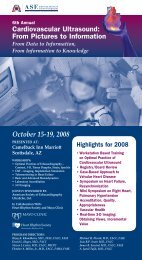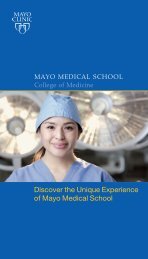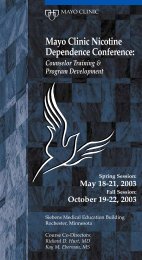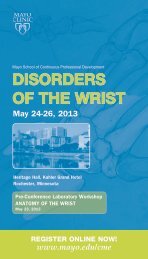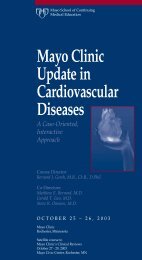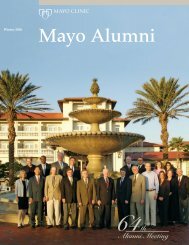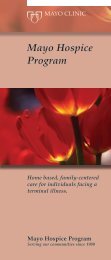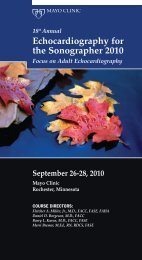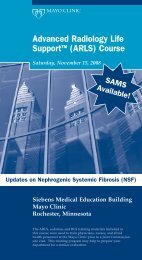Mayo Alumni Magazine 2002 Spring - MC4409-0402 - Mayo Clinic
Mayo Alumni Magazine 2002 Spring - MC4409-0402 - Mayo Clinic
Mayo Alumni Magazine 2002 Spring - MC4409-0402 - Mayo Clinic
You also want an ePaper? Increase the reach of your titles
YUMPU automatically turns print PDFs into web optimized ePapers that Google loves.
“It is a great thing to make scientific discoveries of rare value,<br />
but it is even greater to be willing to share these discoveries and to<br />
encourage other workers in the same field of scientific research.”<br />
— William J. <strong>Mayo</strong>, M.D.<br />
More than 2,000 potential trial sites are in its database<br />
— those are sites that have registered with the alliance, but<br />
are not in a study at this time. While most of the sites focus<br />
on cardiovascular disease, plans call for the recruitment of<br />
up to an additional 2,000 sites in other specialties.<br />
<strong>Alumni</strong> who are interested in participating with the<br />
alliance can benefit from the work at <strong>Mayo</strong> <strong>Clinic</strong>.<br />
“I was in private practice for a couple of years before I<br />
came to this position,” says Dr. Kopecky. “And you’re just<br />
so busy, you often don’t have time to step back and ask the<br />
right questions. When you’re involved in research with a<br />
multi-site trial, such as the ones we run, you get to be part<br />
of ongoing research. You aren’t spending time setting<br />
things up.”<br />
Dr. Kopecky cites William J. <strong>Mayo</strong>, M.D., whose quote<br />
summarizes the aim of <strong>Mayo</strong> Physician Alliance for<br />
<strong>Clinic</strong>al Trials: “It is a great thing to make scientific<br />
discoveries of rare value, but it is even<br />
greater to be willing to share these<br />
discoveries and to encourage other<br />
workers in the same field of scientific<br />
research.”<br />
How it works<br />
<strong>Mayo</strong> Physician Alliance for <strong>Clinic</strong>al<br />
Trials is based in the Stabile Research<br />
Building on the main campus at <strong>Mayo</strong><br />
<strong>Clinic</strong> in Rochester. The growth of the<br />
alliance has been steady, but not<br />
without challenges, says Dr. Kopecky.<br />
“A truly integrated multi-center<br />
clinical trials program does not appear<br />
overnight,” says Dr. Kopecky. “There<br />
were three major challenges: first, the<br />
general reputation of academic centers<br />
among sponsors is that they are<br />
inefficient and slow. We have to continue to overcome<br />
this misperception. Communicating and demonstrating<br />
to sponsors that we are fast and efficient has been a<br />
priority for us.<br />
“Second, among medical researchers, it is not<br />
uncommon for payment from sponsors to be viewed as<br />
potentially compromising the integrity of research. We<br />
have had to work with our trial sites to assure them that<br />
this is not the case. The third challenge is that of building<br />
awareness among potential trial sponsors and potential<br />
trial sites.”<br />
Studies by the alliance have been completed in a variety<br />
of clinical areas including cardiovascular disease,<br />
neurogenetics, endocrinology, lipids, coagulation<br />
(hematology), immunology and rheumatology,<br />
gastroenterology, orthopedic surgery and nephrology.<br />
In one study, researchers evaluated a “super aspirin” that<br />
blocks the body’s ability to clot.<br />
There are 13 studies in progress. One is a 50-site<br />
trial examining the genetics of stroke patients and their<br />
siblings.<br />
Mid-State Cardiology in Nashville, Tenn., is one of the<br />
sites that has worked with <strong>Mayo</strong> for about a year.<br />
“It’s helpful to work with them, because they do the<br />
legwork to find the studies,” says Janice Sensing, research<br />
coordinator at Mid-State Cardiology, who works with<br />
Mini Das, M.D., a <strong>Mayo</strong> alumna. “We focus on our work<br />
here and don’t have to spend the time looking for quality<br />
clinical trials.”<br />
Fulfilling a mission<br />
<strong>Mayo</strong> Physician Alliance for <strong>Clinic</strong>al<br />
Trials started first as a site management<br />
organization, but Dr. Kopecky says<br />
“We felt we needed a more robust<br />
organization to really get our hands<br />
deep into multi-site trial research in<br />
order to fulfill <strong>Mayo</strong>’s commitment to<br />
medical research.”<br />
Investigators enrolled with <strong>Mayo</strong><br />
Physician Alliance for <strong>Clinic</strong>al Trials<br />
not only benefit from being involved in<br />
medical science and education, but they<br />
can access the educational opportunities<br />
such as educational conferences and<br />
Web-based education.<br />
In 2001, educational conference<br />
topics included: <strong>Clinic</strong>al Trials Research: Forthcoming<br />
Issues, and Dilemmas in Acute Cardiac Care: A Case-<br />
Oriented Approach. Web-based education programs are<br />
designed for physician investigators and clinical study<br />
coordinators and address such topics as Informed Consent<br />
and Roles; Responsibilities of the Investigator, <strong>Clinic</strong>al<br />
Research Coordinator and Sponsor; The Principles of<br />
Good <strong>Clinic</strong>al Practice; Institutional Review Board Role<br />
and Responsibilities; and Privacy and Confidentiality.<br />
Future programs will be developed to contain at least<br />
16 educational modules.<br />
<strong>Spring</strong> <strong>2002</strong> <strong>Mayo</strong> <strong>Alumni</strong> 15





